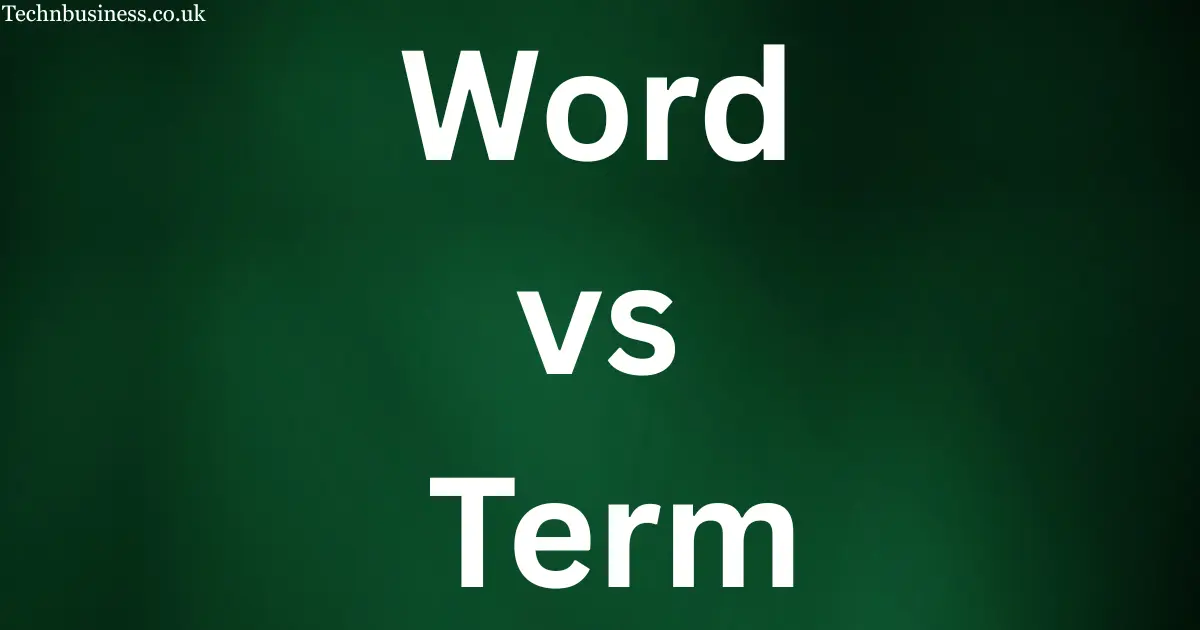Have you ever paused mid-sentence wondering whether to say “Word vs Term”? You’re not alone. The distinction between a “word” and a “term” often confuses even native English speakers and seasoned writers.
At first glance, they may seem interchangeable—but they’re not. Understanding the difference is essential for clear communication, especially in academic, legal, or technical writing.
In this article, we’ll break down the definitions of “word” and “term,” highlight their differences, explore their proper usage, and offer practical tips to choose the right one. Let’s settle the “term vs word” debate once and for all.
Word vs Term – What’s the Difference?
What Is a Word?
A “word” is the smallest unit of language that carries meaning and can stand alone or be combined with others to form sentences.
- Etymology: From Old English “word,” meaning “speech” or “utterance.”
- Common Mistakes: Using “word” when you mean a technical or specialized concept (which should be “term”).
What Is a Term?
A “term” is a word or phrase used in a specific context—especially within a field like science, law, or academia.
- Etymology: From Latin “terminus,” meaning “end” or “boundary”—implying definition and specificity.
- Common Mistakes: Overusing “term” in casual contexts where “word” would suffice.
What Is a Word?
- Definition: A word is a single unit of language with meaning, either spoken or written.
- Usage in Sentences:
- “She mispronounced the word ‘philosophy.’”
- “What’s the longest word in the dictionary?”
- Contextual Usage: Used in everyday conversation, literature, and grammar discussions.
Additional Notes: Words can function as different parts of speech, such as nouns, verbs, adjectives, and adverbs. They form the foundation of sentences and can exist independently or as part of a larger phrase.
What Is a Term?
- Definition: A term is a word or phrase with a specific meaning in a particular field.
- Usage in Sentences:
- “Photosynthesis is a biological term.”
- “The contract includes several legal terms.”
- Contextual Usage: Common in academic, technical, legal, and medical texts.
Additional Notes: Terms are often defined in glossaries or dictionaries related to specific disciplines. They reduce ambiguity and ensure clarity within specialized communication.
Key Differences Between Word and Term
| Aspect | Word | Term |
| Definition | Basic unit of language with meaning | Specialized word or phrase used in a specific field |
| Common Usage | General speech and writing | Technical or domain-specific writing |
| Context | Everyday language | Academic, legal, scientific |
| Grammar Role | Noun, verb, adjective, etc. | Usually noun or noun phrase |
| Common Mistakes | Using for technical concepts | Using in informal, non-specific settings |
Example Scenarios to Illustrate the Difference
1. Medical Field:
- Word: “Pain”
- Term: “Chronic pain syndrome”
2. Technology:
- Word: “Mouse”
- Term: “Graphical user interface”
3. Legal:
- Word: “Agreement”
- Term: “Non-disclosure agreement”
4. Education:
- Word: “Learn”
- Term: “Experiential learning”
Why Do People Confuse Word and Term?
- Overlapping Definitions: Every term is a word or phrase, but not every word qualifies as a term.
- Formal vs. Informal Contexts: People may choose “term” to sound more formal even when “word” would be more accurate.
- Lack of Field-Specific Knowledge: Without understanding the domain, people might not recognize a term’s specificity.
- Educational Gaps: Grammar and language distinctions are often glossed over in standard education.
Synonyms & Antonyms
| Word Type | Synonyms | Antonyms |
| Word | expression, phrase, utterance | silence, void, inarticulate |
| Term | expression, phrase, concept | ambiguity, slang, generality |
Which One Should You Use? (Practical Tips for Writers)
- 🧠 Quick Rule of Thumb:
Use “word” for general use. Use “term” when the word has a specific, defined meaning in a particular context. - 🛠️ Writer’s Tip:
Ask yourself: “Is this used within a field or discipline?”- Yes → It’s a term
- No → It’s a word
- ✅ Checklist:
- Is it part of everyday vocabulary? → Word
- Is it explained in a textbook or glossary? → Term
- Is it jargon in a profession? → Term
FAQs
Can a word be a term?
Yes. A word can be a term if it has a specialized meaning in a specific field. For example, “cell” is a word, but in biology, it’s also a term.
Is a phrase a term?
Sometimes. A phrase becomes a term when it carries specific meaning in a context. Example: “due diligence” in business law.
Are slang words considered terms?
Generally no. Slang is informal and context-sensitive but not typically used in formal or technical writing.
How do I know if I’m using the right one?
Consider the audience and context. If you’re writing academically or professionally, check if the word is part of a known lexicon in that field.
What does the term “term” mean?
Meta alert! The word “term” refers to a word or expression used with a precise meaning, often in a specific context.
Read Also: Roof Replacement Guide: Costs, Materials & Signs to Know
Final Thoughts
Understanding the difference between a word and a term might seem minor, but it plays a big role in precision and clarity—especially in writing. A word is general; a term is specific. Get that right, and your writing will instantly become more accurate and professional.
So next time you’re writing or editing, remember: not every word is a term, but every term is (usually) a word.

